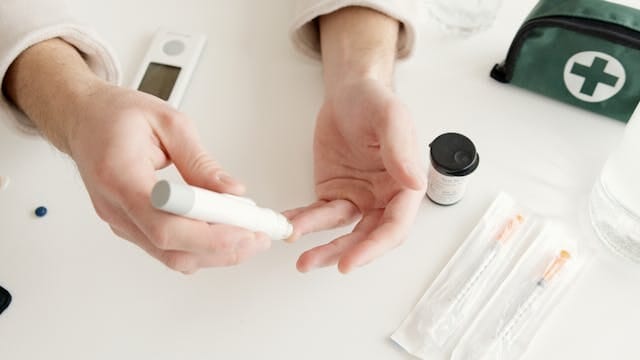
Insulin Resistance - Symptoms, Causes, & Treatment
Time to read 6 min
Time to read 6 min
Insulin resistance or IR is essentially a metabolic condition in which the person's cells become less responsive to insulin over time. This can lead to issues with glucose regulation, making the hormone less effective in maintaining levels within the liver, fat, and muscles.
You can experience dizziness, tiredness, and muscle pain, as some of the preliminary symptoms of the condition. The pancreas continues to develop the hormone to manage the blood glucose levels and keep the cells energized to regulate various systems.
You should keep getting your insulin levels checked regularly, if you have a prior history of IR or other conditions related to glucose levels management. You should also change your diet, lifestyle, and supplementation, if you want to improve your blood glucose management.
These are some of the important symptoms of insulin resistance, which you should track over time. You can also keep a glucose reader ready with you, so that you're able to track your blood sugar levels through the day.
If you have a higher body weight and are managing another health condition, then your risk of insulin resistance may be higher. It is important to check your blood sugar levels through glucose reading, and understand whether you may be at risk.
Your body may require more water to regulate the hormonal levels in the body. High blood sugar levels can lead to a risk of higher thirst and increased need to urinate as well.
You can experience headaches and issues with your vision if you have insulin resistance signs and symptoms. You can check for the underlying reasons for the headache and track whether insulin resistance may be the reason.
You may be more prone to infections if you have a higher insulin resistance level in the body. These can be related to underlying issues with immunity and blood health, along with the secondary impact of high IR.
You can have dark patches of the skin in some cases, which can be indicative of the condition. You should check for other signs of insulin resistance as well to keep a track.
Some individuals with high insulin resistance can have issues with blood pressure management as well. You can track your blood pressure levels at home through a blood pressure reader.
These are some of the causes of IR that have been determined by doctors and specialists. You may be at a higher risk group if you have these parameters associated with your lifestyle, diet, etc. You can understand what causes insulin resistance and make the right changes.
If there is a higher body weight present, with high amount of fatty tissue present, then there is a greater risk of developing insulin resistance. Your cells can become less sensitive to insulin, which may increase your risk of IR.
Lack of physical activity can contribute to weight gain and a decrease in the effectiveness of insulin. You should always ensure that you're able to get adequate walking and running time throughout the week, so that you're able to improve circulation and lower risk of resistance.
Diets high in sugar and processed foods can lead to spikes in blood sugar and insulin levels, which over time can contribute to insulin resistance. You should switch to a natural diet, that is rich in nutrients, so that you're able to improve your metabolic health and wellbeing.
Family history can play a significant role in an individual's risk of developing insulin resistance. The genetic component is important to consider, which is why some cultures may be more prone to IR than others.
Conditions such as polycystic ovary syndrome (PCOS) are associated with insulin resistance. You could also have an impact on your insulin levels if you have other thyroid conditions that can disrupt the normal levels.
Managing insulin resistance involves a combination of lifestyle changes and medical interventions. It is important to understand insulin resistance and start the treatment when you experience the symptoms. You should begin the necessary testing and treatment protocol when you have any hormonal change.
Regular screening for blood sugar levels and insulin sensitivity can help in early detection and management. It is vital to get tested to ensure that you're able to track your body insulin level and understand your entire blood work to understand potential impact.
A diet high in fibre, lean proteins, and healthy fats can lower your risk of developing insulin resistance. You should also consult with your doctor about what dietary changes are needed to regulate sugar levels better.
Regular exercise helps increase insulin sensitivity by helping the muscle cells use glucose more effectively. You can also improve circulation, regulate your hormones, and improve your sleep quality when you're able to boost your physical activity.
You may need to start medication to improve your insulin levels. Doctors would have to perform a range of tests prior to prescribing medication, which is why it is important to keep a track of your levels if you have insulin resistance.
It's important to get a complete IR check-up done, as well as talk to your doctor about the levels of IR in the body. You can start medication which can help improve your insulin levels, and decrease the associated symptoms.
This medication improves the effectiveness of insulin in your body and is often the first-line treatment. It has an impact on the glucose transporter or GLUT 4 expression and the levels of IR in the body. Your doctor may prescribe the medication for the management of insulin levels in the body.
These are drug groups that are insulin sensitizers which act on intracellular metabolic pathways. They can help improve the insulin levels in the body by increasing the sensitivity to insulin in the muscles and fat cells.
Insulin resistance is a condition where the body's cells do not respond effectively to insulin, making it difficult to regulate blood sugar levels. Over time, this can lead to type 2 diabetes.
The most effective treatment involves lifestyle changes such as improving diet, increasing physical activity, and maintaining a healthy weight. Medications like metformin can also be prescribed. You should consult with your doctor about the best course of action for your insulin levels, depending on your individual blood work and medical history.
Eating a diet rich in whole foods like vegetables, fruits, whole grains, and lean proteins can help. You should focus on probiotics, high fibre, and foods that are low in GI or glycaemic index.
Yes, insulin resistance is associated with several other conditions, including type 2 diabetes, heart disease, and PCOS.
Symptoms may include fatigue, hunger after eating, weight gain, brain fog, high blood pressure, and high cholesterol levels. Many people are asymptomatic in the early stages.
A diet high in fibre, low in processed sugars, and rich in whole foods can improve insulin sensitivity. Foods like leafy greens, nuts, seeds, and lean proteins are advisable.
Understanding and managing insulin resistance through lifestyle changes and appropriate medical interventions can significantly improve one's quality of life and reduce the risk of developing type 2 diabetes and related complications. As with any medical condition, consulting with healthcare providers for personalized advice is crucial.
** Medical Disclaimer - The following information is for educational purposes only. No information provided on this website, including text, graphic, and images, are intended as substitutes for professional medical advice. Please consult with your doctor about specific medical advice pertaining to your condition(s).
Latest News

